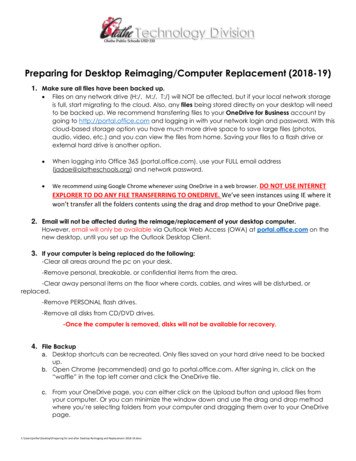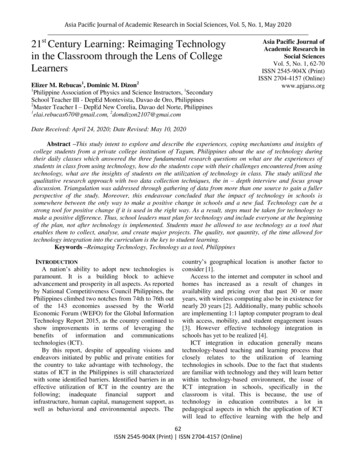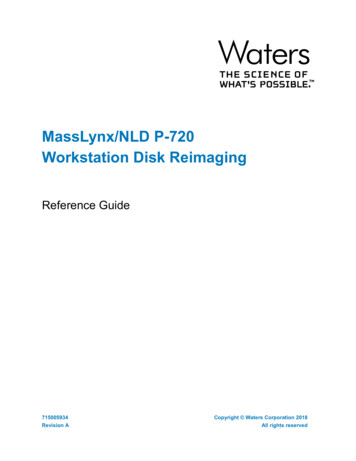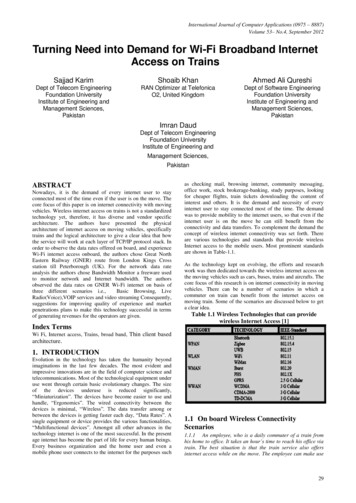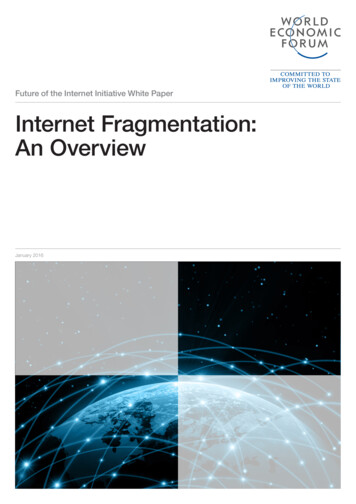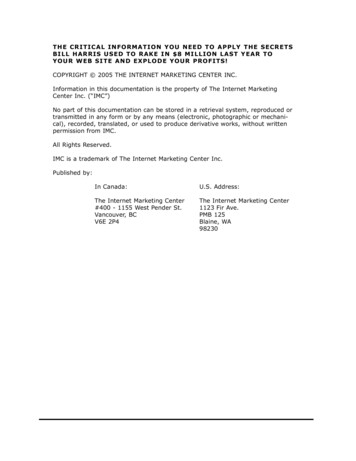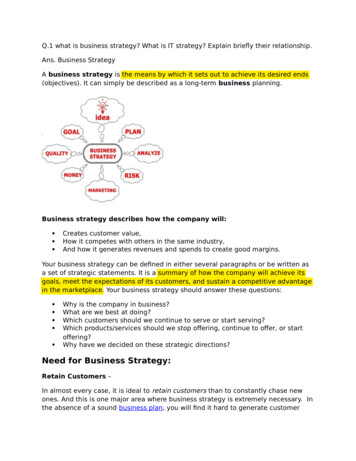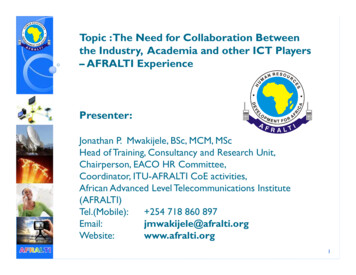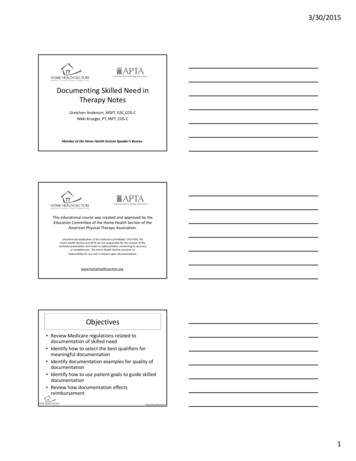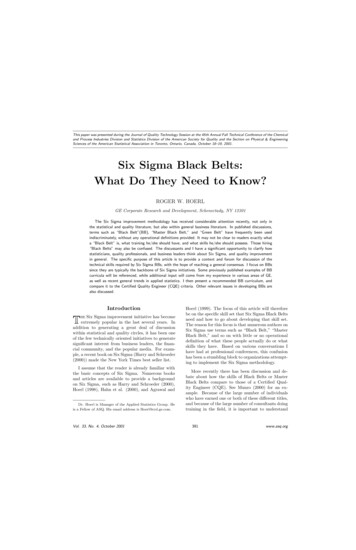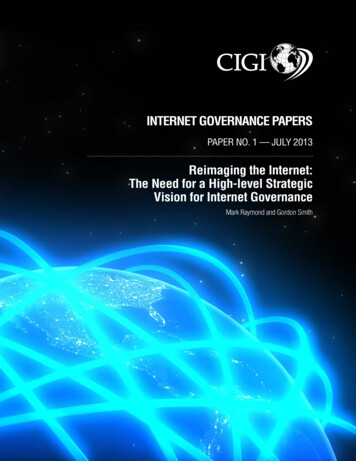
Transcription
INTERNET GOVERNANCE PAPERSPAPER NO. 1 — JULY 2013Reimaging the Internet:The Need for a High-level StrategicVision for Internet GovernanceMark Raymond and Gordon Smith
INTERNET GOVERNANCE PAPERSPAPER NO. 1 — JULY 2013Reimaging the Internet:The Need for a High-level StrategicVision for Internet GovernanceMark Raymond and Gordon Smith
Copyright 2013 by The Centre for International Governance Innovation.The opinions expressed in this publication are those of the authorsand do not necessarily reflect the views of The Centre for InternationalGovernance Innovation or its Operating Board of Directors or InternationalBoard of Governors.This work was carried out with the support of The Centre for InternationalGovernance Innovation (CIGI), Waterloo, Ontario, Canada (www.cigionline.org). This work is licensed under a Creative CommonsAttribution — Non-commercial — No Derivatives License. To view thislicense, visit (www.creativecommons.org/licenses/ by-nc-nd/3.0/). Forre-use or distribution, please include this copyright notice.Cover and page design by Steve Cross.ACKNOWLEDGEMENTCIGI gratefully acknowledges the support of the Copyright Collective ofCanada.
CONTENTSAbout the Authors1About Organized Chaos:Reimagining the Internet Project2Acronyms2Executive Summary3The Need for a High-level Strategic Vision for InternetGovernance, 2015–20203The Legacy System of Internet Governance7Global Governance, Rule-making and the Future of the Internet8Toward a Comprehensive, Research-based Vision for InternetGovernance15Works Cited19About CIGI20
Internet Governance PapersReimaging the Internet: The Need for a High-level Strategic Vision for Internet GovernanceABOUT THE AUTHORSMark Raymondhis personal involvement with the G7/G8, as the Sherpa(personal representative) for the prime minister at the G7/G8 summits in Halifax, Lyon and Denver. After retiringfrom the Government of Canada that same year, Gordonjoined the University of Victoria as executive director ofthe Centre for Global Studies (CFGS), and was appointedchair of the board of governors at the InternationalDevelopment Research Centre. During this period, he alsolectured as a visiting professor at the Diplomatic Academyof the University of Westminster in London and Paris.Mark Raymond joined CIGI as a research fellow in August2012. He has a B.A. in political science and internationalrelations from the University of Western Ontario and anM.A. and Ph.D. in political science from the Universityof Toronto, and he has taught international relations atthe University of Toronto and the University of Waterloo.His research interests include international law andorganization, international security and internationalhistory, including the history of global governance.After collaborating with the think tank for many yearson various projects, Gordon joined CIGI in 2010 as adistinguished fellow, and has since been a key contributorto its G20 research activities, events and publications.He looks forward to continuing this work at CIGI, andpursuing another long-time interest: the convergence oftechnology and global affairs (you can follow Gordon onTwitter @GordonSmithG20).At CIGI, Mark contributes to the Global Security Program.Specifically, he is developing CIGI’s work in the area ofInternet security and governance.Gordon SmithA political science graduate of McGill University (B.A.)and the Massachusetts Institute of Technology (Ph.D.),Gordon Smith became interested in international securityand global interdependence while attending university inthe United States during the Cuban Missile Crisis in 1962.After graduation, Gordon returned to Canada to work onthese issues, and began a long and distinguished career asa public servant with the federal government.Initially, Gordon worked on Canada’s relationship withNATO and the North American Aerospace DefenseCommand (NORAD) within the Ministry of Defence andDepartment of External Affairs, but he quickly advancedto more demanding positions in the Privy Council Office.In 1979, Gordon became the deputy under-secretary ofstate at External Affairs, and in 1985, deputy minister.Shortly thereafter, he was dispatched to Brussels asthe permanent representative and ambassador to theCanadian delegation to NATO, and subsequently, wasnamed Canada’s ambassador to the European Union.Returning to Canada in 1994, Gordon was appointeddeputy minister of Foreign Affairs, where he fondlyremembers establishing a global issues bureau in theministry to better understand emerging transnationaltrends affecting Canada. During this time, Gordon beganMark Raymond and Gordon Smith1CIGIONLINE.ORG
Internet Governance PapersReimaging the Internet: The Need for a High-level Strategic Vision for Internet GovernanceABOUT ORGANIZED CHAOS:REIMAGINING THE INTERNETPROJECTACRONYMSHistorically, Internet governance has beenaccomplished en passant. It has emerged largely fromthe actions of computer scientists and engineers,in interaction with domestic legal and regulatorysystems. Beginning at least with the 2003–2005World Summit on the Information Society process,however, there has been an explicit rule-makingagenda at the international level. This strategicagenda is increasingly driven by a coalition of states— including Russia, China and the Arab states — thatis organized and has a clear, more state-controlledand monetary vision for the Internet. Advancedindustrial democracies and other states committedto existing multi-stakeholder mechanisms have adifferent view — they regard Internet governance asimportant, but generally lack coherent strategies forInternet governance — especially at the internationallevel. Given the Internet’s constant evolution and itseconomic, political and social importance as a publicgood, this situation is clearly untenable.DDoSDistributed Denial of ServiceGACGovernmental Advisory Committee (ICANN)G-77Group of 77 (United Nations)ICANNInternet Corporation for Assigned Names andNumbersIETFInternet Engineering Task ForceISPsInternet service providersITRsInternational Telecommunications RegulationsITUInternational Telecommunications UnionOECDOrganisation for Economic Co-operation andDevelopmentOTTover-the-topWCITWorld Conference on InternationalTelecommunicationsWSISWorld Summit on the Information SocietyA coherent strategy is needed to ensure that difficulttrade-offs between competing interests, as well asbetween distinct public values, are managed in aconsistent, transparent and accountable manner thataccurately reflects public priorities. Guided by theseconsiderations, CIGI researchers believe they can playa constructive role in creating a strategy for statescommitted to multi-stakeholder models of Internetgovernance.In aiming to develop this strategy, the project memberswill consider what kind of Internet the world wantsin 2020, and will lay the analytical groundwork forfuture Internet governance discussions, most notablythe upcoming decennial review of the World Summiton the Information Society. This project was launchedin 2012. The Internet Governance Paper series willresult in the publication of a book in early 2014.Mark Raymond and Gordon Smith2CIGIONLINE.ORG
Internet Governance PapersReimaging the Internet: The Need for a High-level Strategic Vision for Internet GovernanceEXECUTIVE SUMMARYTHE NEED FOR A HIGH-LEVELSTRATEGIC VISION FORINTERNET GOVERNANCE,2015–2020Internet governance is increasingly the stuff of“high politics.” As the Internet has become moreimportant, existing stakeholders have identified newinterests; new entrants to the policy space, includinga number of emerging market states, are bringingtheir interests and distinct values to bear. This paperargues that the contemporary politics of Internetgovernance are best understood as a complex, highstakes case of rule-making. The key question is howto refine and update Internet governance given asecular increase in state interest, geopolitical rivalry,the existence of legacy institutions and high levelsof civil society engagement. This task is complicatedby the fact that participants have diverging views onlegitimate procedures for making, interpreting andapplying rules. Understanding Internet governanceas rule-making yields two other insights. First, theInternet is not governed by a single set of rules.Accordingly, the view that the Internet is a commonsshould be set aside in favour of the image of a seriesof overlapping voluntary and involuntary groupingsgoverned by multiple sets of rules. Second, opennessto employing informal rules and soft law instrumentsoffers advantages in allowing policy makers timeto learn about the implications of alternative rulesfor Internet governance and in allowing proceduralflexibility. The paper concludes by articulating theneed for a high-level strategic vision for Internetgovernance. The CIGI Internet Governance Papersseries aims to provide world-class research that canunderpin the creation of such a vision.The Internet has never been an ungoverned space.Even in its earliest days, it had “rules of the road.”In fact, if not for such rules, the Internet wouldnot — could not — exist. Peering agreements, thenaming and numbering system, and packet handlingprotocols are only some of the critical rules that makethe Internet possible and regulate its operation.Equally important, however, is the observationthat current standards are not the only possible setof such arrangements. As Laura DeNardis (2009)explained in Protocol Politics, technical protocols areinextricably political.The novel nature of the technology, combined withan initial lack of obvious mass social purposes,provided the researchers, engineers and othertechnologists that comprised the bulk of the originalInternet community with a great deal of autonomy increating and operating its first governance structure.1Early Internet governance arrangements were thusprimarily the product of a decentralized socialnetwork in which authority emerged on the basis ofspecialized expertise, and problems were typicallyunderstood as exclusively technical in nature.2As a result of the social endowments providedby these “parental” influences, current Internet1For an overview of this history, see Barry M. Leiner et al.(2012),“A Brief History of the Internet,”available at: tory-internet/brief-history-internet.2Such networks or “epistemic communities” have beenpreviously studied by international relations scholars in other issueareas. See, for example, Peter M. Haas (1992), “Introduction: EpistemicCommunities and International Policy Coordination,” InternationalOrganization 46, no. 1: 1–35.Mark Raymond and Gordon Smith3CIGIONLINE.ORG
Internet Governance PapersReimaging the Internet: The Need for a High-level Strategic Vision for Internet Governancegovernance arrangements reflect a particular setof values: resilience, openness and interoperability,high potential for anonymity, content neutralityand disregard for national borders in the routing ofinformation between users. These values are at odds,at least in some significant respects, not only withdomestic expectations in some states about freedomof expression and the handling of information, butalso with central rules and norms of the internationalsystem, including classical understandings of statesovereignty.3of the change has not yet been determined. Second,the last seven to 10 years have seen considerablematuration of Internet services aimed at masspublics — e-commerce, social networking and cloudcomputing are obvious examples. Third, multiplecritical infrastructure systems are now dependenton the Internet in significant, albeit varying, ways:financial markets and banks, oil and gas productionand distribution networks, as well as power gridsare vulnerable, as are major transportation andlogistics systems. Fourth, there has been significantexpansion of what might be termed the Internet’s“dark side.” This label includes an array of activitiesperformed by a variety of actors for a number ofpurposes; the common thread is that they are sociallyundesirable. Cybercrime — including fraud, identitytheft, and the creation and operation of illegalbotnets — is becoming increasingly widespreadand more sophisticated (Glenny, 2011). Multiplereports have shed light on cyber-espionage practicesconducted either by states or state agents. There arerecent indications that these activities have movedbeyond information gathering to include probingfor vulnerabilities in both government and privatesector networks (Information Warfare Monitor, 2009;Mandiant, 2013). Further, although the evidence isfragmentary, there is reason to suspect that severalstates have conducted or authorized actual cyberThese tensions were emerging by the time of theinitial World Summit on the Information Society(WSIS), which met in Geneva in 2003 for its firstphase, with the second phase held in Tunis in 2005.In the intervening years, a number of trends havecombined to exacerbate these issues. First, Internettechnology penetration rates have increasedsignificantly in all but the most authoritarian andimpoverished states.4 This trend is almost certain tocontinue; however, even today the changing culturalcomposition of global Internet users means that newvoices (and in some cases different values) are beingheard in Internet governance debates and processes.This can be expected to result in a differentlygoverned Internet — although the nature and extent3On sovereignty, see Jens Bartelson (1995), A Genealogyof Sovereignty, Cambridge: Cambridge University Press; Hedley Bull(1977), The Anarchical Society, New York: Columbia University Press;Andreas Osiander (2001), “Sovereignty, International Relations, andthe Westphalian Myth,” International Organization 55, no. 2: 251–287;Daniel Philpott (2001), Revolutions in Sovereignty: How Ideas ShapedModern International Relations, Princeton: Princeton University Press;and Hendrik Spruyt (1996), The Sovereign State and its Competitors: AnAnalysis of Systems Change, Princeton: Princeton University Press.4For one estimate, see World Bank, “World DevelopmentIndicators,” Internet Users (per 100 people), available at http://data.worldbank.org.Mark Raymond and Gordon Smith4CIGIONLINE.ORG
Internet Governance PapersReimaging the Internet: The Need for a High-level Strategic Vision for Internet Governanceattacks.5 More governments are working to establishand enhance their capabilities to conduct suchoperations.Internet governance and to generate demand for amore global alternative.The desire to extend state control over Internetgovernance is widely shared, even by advancedindustrial economies. The Internet is now simply tooimportant to leave entirely to the technologists. Thereare, however, significant differences among stateswith respect to their preferences over the substantivecontent of such change. The December 2012 WorldConference on International Telecommunications(WCIT) held in Dubai, confirmed the existence ofcomplex fault lines in the international community.As a result of these pressures and tensions, aswell as the desire to monetize the Internet totheir advantage (or at least the advantage of theircorporations), states have increasingly becomedetermined to exert influence and authority overInternet governance. The contractual arrangementbetween the National Telecommunications andInformation Administration (part of the UnitedStates Department of Commerce) and the InternetCorporation for Assigned Names and Numbers(ICANN), the California-based non-profit thatoversees naming and numbering, has also served tocomplicate the legitimacy of the current system for5A broad coalition led by Russia and Chinaengineered the adoption of updated InternationalTelecommunications Regulations (ITRs) as wellas International Telecommunications Union (ITU)resolutions affirming an expanded state role inInternet governance, and empowering the ITU tofurther debate and discuss Internet issues. Thiscoalition attracted broad participation from thedeveloping world, including key support fromArab states; however, it also included key emergingeconomies such as South Korea, Indonesia, Turkey,Brazil, Argentina and Mexico. A smaller groupof states (including key advanced industrialdemocracies such as the United States, UnitedKingdom, Canada, Sweden and New Zealand,joined by a number of other states including Indiaand Kenya) refused to accept either the new ITRsor the accompanying non-binding resolutions(Pfanner, 2012).On Stuxnet, see David Sanger (2012), “Obama OrderSped Up Wave of Cyberattacks Against Iran,” New York Times, June 1,available at: rdered-wave-of-cyberattacks-against-iran.html? r 2&pagewanted 2&seid auto&smid tw-nytimespolitics&pagewanted all.OntheMahdi malware, see Nicole Perlroth (2012),“Cyber Attacks from Iran andGaza on Israel More Threatening than Anonymous’s Efforts,” Bits Blog,November 20, than-anonymoussefforts/. On the Flame malware, see Nicole Perlroth (2012),“ResearchersFind Clues in Malware,” New York Times, May 30, available at: link-flame-virus-tostuxnet-and-duqu.html. For information on the Aramco attacks, seeNicole Perlroth (2012), “In Cyberattack on Saudi Firm, U.S. Sees IranThere are, undoubtedly, power politics at play inproducing these coalitions. Russia and China seekto relocate Internet governance to an institutionin which American influence is attenuated, at leastin comparison to its current legal and normativedominance of ICANN and its normative influenceover the Internet Engineering Task Force (IETF). TheUnited States clearly understands and opposes thisFiring Back,” New York Times, October 23, available at: tack-on-saudi-oil-firmdisquiets-us.html?pagewanted all. Russia is thought to have employedoffensive cyber operations against both Estonia and Georgia. See,respectively, “A Cyber-riot” (2007), The Economist, May 10, available at:www.economist.com/node/9163598, and John Markoff (2008), “Beforethe Gunfire, Cyberattacks,” New York Times, August 12, available tml.Mark Raymond and Gordon Smith5CIGIONLINE.ORG
Internet Governance PapersReimaging the Internet: The Need for a High-level Strategic Vision for Internet Governanceattempt by the Russians and the Chinese. In anotherindication that the two coalitions are not separatedpurely by principle, the advanced industrialdemocracies have greatly expanded their technicaland legal ability to monitor both the online activityof their own citizens and of foreigners, often over theobjections of domestic civil society groups. Attemptsto enforce intellectual property laws have alsodrawn determined opposition (Wortham, 2012). Theexistence and success of that opposition, however, isa clear indicator that value-based differences amongstates on Internet governance issues remain highlyconsequential. It is not purely a cynical matter ofnational advantage-seeking.to unwelcome efforts to change the status quo.6Broader civil society groups are also becomingincreasingly engaged. A range of corporate interestsare pursuing their own agendas, some of which arein direct conflict. Network operators, Internet servicecompanies, equipment manufacturers, intellectualproperty holders, insurers and others all havesignificant stakes in Internet governance outcomes.The divisions among corporate actors are geographicas well as sectoral. Legacy telecommunication firms(many of them state-owned and many of these in thedeveloping world) face daunting competition fromthe migration of voice communication to Internetnetworks; network operators in some areas of thedeveloping world (such as the Middle East) also actas key intermediaries for the routing of informationbetween advanced industrial economies,
REImAGING THE INTERNET: THE NEEd FOR A HIGH-LEVEL STRATEGIC VISION FOR INTERNET GOVERNANCE Mark rayMond and Gordon SMith 2 CiGionLinE.orG ABOUT ORGANIZED CHAOS: REIMAGINING THE INTERNET PROJECT Historically, Internet governance has been accomplished en passant. It has emerged largely from the actions of computer scientists and engineers,
